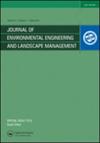THE IMPACT MECHANISM OF HUMAN ACTIVITIES OVER CLIMATE SUITABILITY BASED ON SOCIAL NETWORK DATA: EVIDENCE FROM CHINA
IF 1.1
4区 环境科学与生态学
Q4 ENVIRONMENTAL SCIENCES
Journal of Environmental Engineering and Landscape Management
Pub Date : 2022-02-17
DOI:10.3846/jeelm.2022.15219
引用次数: 0
Abstract
The impact mechanism of human activities on climate suitability is critical for understanding the human-environment nexus. In this study, social network data from Sina Weibo Platform was collected to quantitatively examined the relationship between the seven major types of human activities and climate suitability. The results indicated that the impacts of entertainment, tourism and daily life related human activities on climate suitability are significant (p-value < 0.05). With one-unit (one check-in record/km2) increase of entertainment and tourism related human activities, the coverage rate of climate suitable zone and the length of climate suitable period increase by 0.003% and 0.026 months, respectively. In contrast, one-unit of increase of daily life activities made the Theil entropy index of climate inequity and the length of climate suitable period increase 0.00035 units and shorten 0.014 months, respectively. Moreover, the impact mechanism of human activities on climate suitability showed a significant spatial heterogeneity within regions at different economic level or topographical conditions, which could be explained by the discrepancy of environmental policies, urban form and urban ventilation channel design strategies in China. This work exhibited a further step to new possibilities in clarifying the climate effect of human activities using open-sourced social network data.基于社会网络数据的人类活动对气候适宜性的影响机制:来自中国的证据
人类活动对气候适宜性的影响机制是理解人类与环境关系的关键。本研究通过收集新浪微博平台的社交网络数据,定量考察了7种主要人类活动类型与气候适宜性的关系。结果表明,与娱乐、旅游和日常生活相关的人类活动对气候适宜性的影响显著(p值< 0.05)。与娱乐旅游相关的人类活动每增加1个单位(1个登记记录/km2),气候适宜区覆盖率和气候适宜期长度分别增加0.003%和0.026个月。而日常生活活动每增加1个单位,气候不平等的Theil熵指数增加0.00035个单位,气候适宜期长度缩短0.014个月。此外,人类活动对气候适宜性的影响机制在不同经济水平或地形条件的区域内表现出显著的空间异质性,这可以用环境政策、城市形态和城市通风通道设计策略的差异来解释。这项工作为利用开源社交网络数据阐明人类活动对气候的影响提供了新的可能性。
本文章由计算机程序翻译,如有差异,请以英文原文为准。
求助全文
约1分钟内获得全文
求助全文
来源期刊
CiteScore
1.90
自引率
7.70%
发文量
41
审稿时长
>12 weeks
期刊介绍:
The Journal of Environmental Engineering and Landscape Management publishes original research about the environment with emphasis on sustainability.

 求助内容:
求助内容: 应助结果提醒方式:
应助结果提醒方式:


